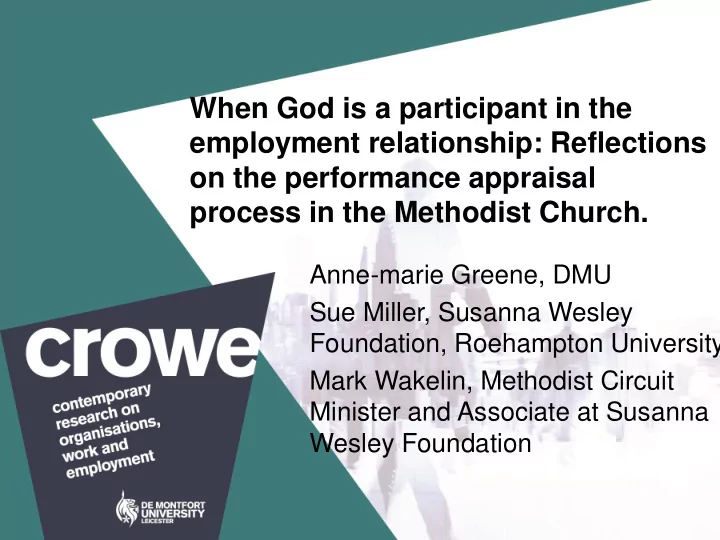

When God is a participant in the employment relationship: Reflections on the performance appraisal process in the Methodist Church. Anne-marie Greene, DMU Sue Miller, Susanna Wesley Foundation, Roehampton University Mark Wakelin, Methodist Circuit Minister and Associate at Susanna Wesley Foundation
Background Debates • Appropriateness of conventional HRM to unconventional contexts – Clergy work and the SER (Vosko, 2010) • Office holding for God (Cranmer, 2012) • Sacrificial embrace (Peyton and Gatrell, 2013) – Church organisations as special or unique (Budde, 2008) • ‘management cannot be ethicized, since the term denotes…all that there is left to do with things once they have been de- sacramentalised … all that is left to do with persons once they have effectively ceased to be regarded as manifesting the image of God’ Milbank (2008; 128) • Guerrier and Bond (2014): ministers as reluctant managers
• Development and operation of individual HRM mechanisms: performance appraisal – External and internal pressure for professionalization/managerialism within church organisations. • DTI Working Group 2004 – Role, purpose, ‘best fit’: practitioner literature – Newton and Findlay (1996): ‘Playing God? The performance of appraisal’ • ‘darker’ side of performance appraisal – Applicability or not of performance appraisal in church context: literature on not for profit sector e.g. (Elden and Sowa, 2011)
The research • 2 related projects • 2014 commission by Methodist Church to gather views of new MDR process – Interviews with 13 presbyters – Analysis of posts to a Facebook group over 6 month period • 2014-15 qualitative interviews with 17 women presbyters including views on MDR process • Interviews with 2 members of the MDR project team • Analysis of performance appraisal documents, Conference proceedings and reports
Findings: Development process and implementation • New scheme: Ministerial Development Review • Antecedents: accompanied self-appraisal scheme; decision to move to a new system from at least 2007; pilot in 5 districts 2008-9. • Key difference: – annual process, – involvement of superintendent or other senior minister • Required care and attention to address potential and expressed concerns and fears of ministers.
• Appreciative inquiry approach • Reassurances that senior oversight was enabling rather than commanding • Lack of formal paper trail attached: key difference to Church of England MDR process. • Reference to theology and Wesleyan principles throughout: recognition of identity issues • Attention to aesthetics: commission a design company to produce the guidance booklets
‘ It was possibly ‘It looked expensive, too expensive important, that it and possibly too was an investment. impractical but Care had been it’s beautiful. I taken in its would defend preparation so we the aesthetic as were inviting people retro chic, which to take care in its in Methodist use ’ terms harks back to a golden age of Methodism’
Findings: Stakeholder Views • Most did not see some form of appraisal as inappropriate or incompatible I think as being typically Wesley he would have… I bet he would provide extremely careful oversight of his preachers, and he would be telling his preachers exactly where they were stepping out of line. And he would be calling them constantly to account. • Majority found the experience positive and useful ‘ affirming’, ‘encouraging’, ‘a useful exercise’, ‘empowering’ • Some even wanted it to be stronger
• Improvement upon old scheme • Supportive of the effort put into designing the new scheme sympathetically I think the title is helpful; it's not an appraisal, it's a review. The material that people were given, I think, quite clearly emphasises the theological aspect of this, the sense of being a connection and care for one another, it's about pastoral care, as well as personal development. MDR, to my mind, would be something which would help people fulfil their God-Given Potential and calling in their own lives. And so I think appraisal has to do with specific... specific targets, specific performance benchmarks and MDR, to my mind, deals with things which are not quite as tangible as that.
Significance • Success of a scheme despite considerable obstacles and barriers • Sensitively designed HRM mechanism: ‘fit’ processes/strategic coupling rather than decoupling • Attention to aesthetics
Recommend
More recommend